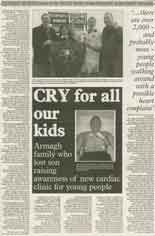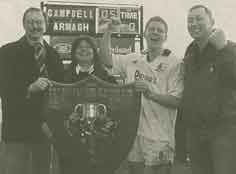The family of Armagh school-boy John McCall – who died a result of a heart defect while playing rugby in 2004 – are advising all parents to have their children screened.
Ian McCall this week told the Gazette that a new clinic – must launched at the University of Ulster in Jordanstown – could prevent other families from having to suffer in the same way they have.
Disbelief followed the death of 18-year-old John, who collapsed during Ireland’s opening World Cup fixture against New Zealand at Durban in March 2004. It was just over a week earlier that John led the Royal School Armagh to Schools’ Cup victory.
The happiness of Ian and Carolyn McCall in seeing their son write a new page in the royal’s rugby history books turned to heartache in South Africa. The community was stunned, a family was devastated.
But the McCalls decided that John’s death to cardiomyopathy – a disease of the heart muscle which very often affects young people – should help others.
Joining with those who have similarly suffered, this saw the information of a local CRY (Cardiac Risk in the Young) group and, last Wednesday, Northern Ireland’s first independently-funded heart screening clinic was launched.
“What we are about is raising awareness of sudden cardiac death and trying to raise funds for the use of raising awareness,” explained Mr McCall.
“We would try and help and support people who have been through a similar situation to ourselves.
“Our mission statement is ‘through information and communication to raise and increase knowledge about life-threatening cardiac conditions that affect young people. Our aim is to make screening accessible to young people across Northern Ireland.”
“That’s what we are about as a group. CRY was set up some time ago across the water, but having a Northern Ireland group now means that any funds raised in Northern Ireland will be used in Northern Ireland”.
CRY has now established the clinic at Jordanstown; while the group has provided the equipment, the University of Ulster provides the facilities and staff. It will operate once a m month – possibly extended, as and when the need arises.
And it could offer a lifeline to many young people who do not yet k now they have a heart complaint. Treatment is possible if complaints are diagnosed.
Said Mr McCall: “The results of the screening are e-mailed to London, where CRY have a resident Cardiologist, Dr Sanjay Sharma, who will read them and advise on a course of action if need be. This is up and running now. If you went to get screened today, you would find it difficult on the National Health, where you would just join the waiting list.
“If you were to go private, if could cost you up to £350. Sometimes that can be off-putting, and you will have to wait your turn. We can offer subsidised screening for £35 per person.
“According to Dr Sharma, there are over 2,000 – and probably more – young people walking around with a possible heart complaint. the sad thing is that the heart, because it is a major organ, if there is a problem it can result in fatalities. So you don’t have room to wait”.
Indeed, waiting is simply not an option, according to Mr McCall, who feels that all young people in the 12 to 20 age bracket – regardless of fitness and lifestyle – should be tested.
Shortly after John died, the coach of the Portora Royal School rugby team decided to have his young players screened before embarking on a tour of Australia. One of the schoolboys was diagnosed with a heart complaint and, while he still attended the turn, was told not to play any sport.
Mr McCall went on: “He went back to school in September and, one Saturday, when just knocking about a tennis racket, he dropped dead. Unfortunately it was too late. The health system let him down.
“”With the likes of cancer and leukaemia, there are so many different problems to look at. I fully understand that, in the grand scheme of things, sudden cardiac death is down the line a bit. but that needs to change.
“We know as a family what it can mean to lose someone this way. It’s almost like a thief has come into your house and stolen your son or daughter.
“We hope that, through this joint venture with the University of Ulster, we can stop this happening and raise awareness.
“We only hear of the John McCalls and the Cormac McAnallens because they are high profile people. Since then there have been a number of families in the Armagh area who have experience sudden cardiac death.
“It’s the high profile cases like John an Cormac that bring it to people’s minds. this initiative has come too late for the families in CRY. Before John died we as a family knew nothing about sudden cardiac death, but we now know that we can help stop other families suffering.
“The burden of grief never leaves. It’s two-and-a-half years since John died. But you never come to terms with the death of a young person. It’s against the grain. Having this knowledge and being involved with this group and getting the clinic up and running in some way softens the grief. I would love to be able to say it takes away the grief, but it doesn’t. It softens it”.
There’s an urgent message in his words that is echoed by each and every member of CRY who, through their own personal losses, want others to take not.
“We would advise parents of anyone of secondary school age to get their children screened,” Mr McCall added.
“I can’t say that enough. It’s not difficult, it only takes about 20 or 25 minutes.
“Young people who are doing sport are doing quite a bit of sport. They have a bigger sporting agenda than I did when I was at school 30 years ago. If there is a problem with someone’s heart then the pressure of the extra sport can bring that to the fore, and in the majority of times that can lead to sudden cardiac death”.
Of course, screening is something which CRY believes should be done as a matter of course, with much greater emphasis being put on getting the message across.
Mr McCall explained: “Italy is the only European country which screens all children as a matter of policy and they have the lowest incidence of sudden cardiac death. CRY as an organisation believes the statistics are a lot higher than the Government would say.
“We have been trying to get them to introduce screening in all secondary schools. We don’t heart all of the deaths. John’s death and Cormac’s death has kicked off a lot of interest in Northern Ireland and helped get this deal going with the University of Ulster.
“We want to put it out there to the people of Northern Ireland, whether in Castlederg or Warrenpoint, Ballymena or Fermanagh. If someone hears of someone coming home from schools saying ‘I’m having dizzy spells’ or ‘I’m feeling faint’, it sets alarm bells ringing. We need to get them screened.
“We beat ourselves up as parents because we thought we should have seen something wrong with John.
“The match in which John died wasn’t that intense. The game was start and stop. John died about 22 minutes into the game. About 10 days before he had been playing for the Royal School when they won the Schools’ Cup. We thank God he didn’t drop dead that day. We thank God it was during the international match. That in itself has helped raise awareness. If he had dropped dead in the garden it would not have had the same impact.
“We’ve got to use his death so that we can avert other families from the same fate. Parents must listen and they must take action”.
The first ECG clinic will be held at the University of Ulster at Jordanstown on Saturday November 25. For an appointment, contact the CRY Northern Ireland Screening Administrator on 01737 363 222, or email cryni@c-r-y.org.uk For futher news on the work of CRY – and information on cardiac conditions and sudden cardiac death – check out the website at http://www.c-r-y.org.uk/NI







